Physikerin der Woche 2025
Starting from January 2018, the German Physical Society's working group on equal opportunities (AKC) has been regularly featuring women in physics who are based in Germany or German women who are working in the field of physics abroad.
If you are a woman working in the field of physics in Germany or a German woman working in physics abroad and would like to showcase your work through the "Physikerin der Woche" initiative, then don't hesitate to get in touch with Dr. Ulrike Boehm at . This opportunity is open to women in physics at all career stages, whether they are from academia or industry. Moreover, you are also welcome to recommend suitable candidates for the initiative.
You can find an article and posters about our initiative in the April 2018 issue and 2021 / 2022 / 2023 issues of the Physik-Journal. You are welcome to print the posters and promote our initiative at your research institution. To view previous participants from past years, please refer to the following resources: 2018, 2019, 2020, 2021, 2022, 2023 und 2024.
Further interesting information on the topic of career preparation for physicists can also be found on the following DPG pages: Berufsvorbereitendes Programm der DPG and DPG-Berufsvorbereitung online der jDPG
March
Dr. Maike Pfalz (Weinheim) - Kalenderwoche 14
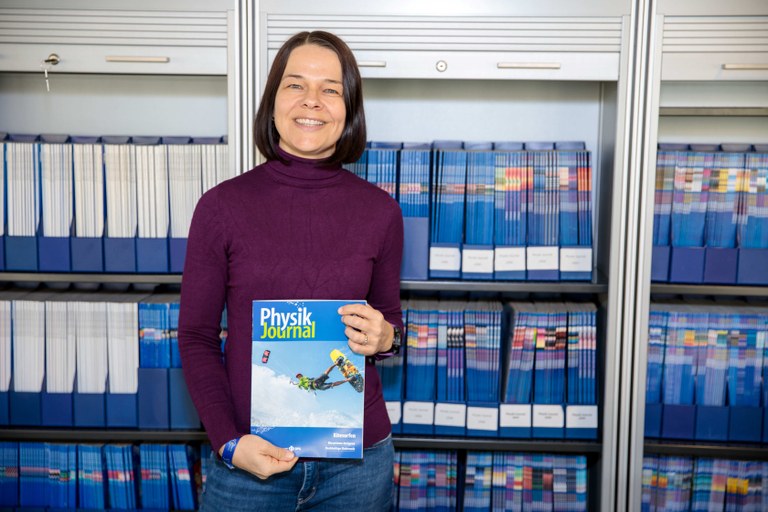
Maike is the editor-in-chief of Physik Journal, the membership journal of the German Physical Society (DPG). After studying to become a teacher in mathematics and physics in Hannover, Maike decided to pursue a PhD focusing on biophysics. While writing her doctoral thesis, she realized that she greatly enjoyed writing and that it could be the right career path for her. Immediately after completing her PhD, she undertook a three-month internship at a textbook publisher, followed by a one-year employment as a physics editor at the same publisher.
In spring 2007, she moved to Weinheim to work for Wiley-VCH as an editor at Physik Journal, and since late summer 2015, she has been leading the journal. The most exciting aspect of her job is the close contact with renowned researchers from all areas of physics. Through her work at Physik Journal, she has learned more than in some physics lectures.
Foto-Rechte: Mario Müller
M.Sc. Sarah Louisa Pitz (Frankfurt am Main) - Kalenderwoche 13
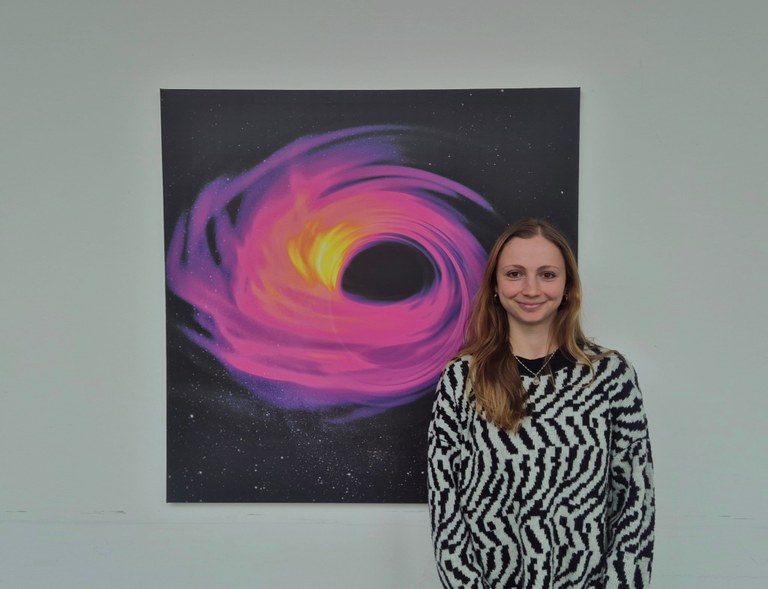
Foto-Rechte: Sarah Louisa Pitz
Dr. Hanieh Fattahi (Erlangen) - Kalenderwoche 12
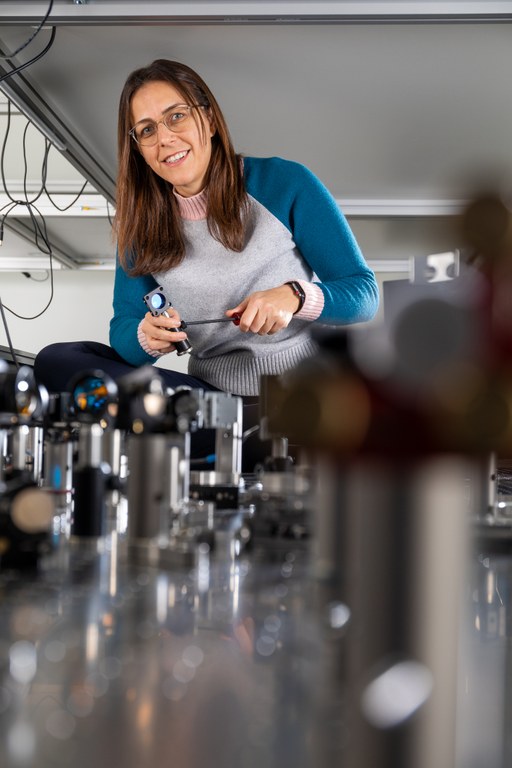
Her research focuses on advancing label-free sensing and imaging technologies by "Femtosecond Fieldoscopy," an approach for the direct detection of the electric field of light. Moreover, she is advancing sustainable solutions for space exploration by developing low-threshold solar lasers.
In 2024, she received an ERC Consolidator Grant to advance 'Label-free microscopy' research.
Foto-Rechte: Axel Griesch
M.Sc. Bianca Lauster (Mainz) - Kalenderwoche 11
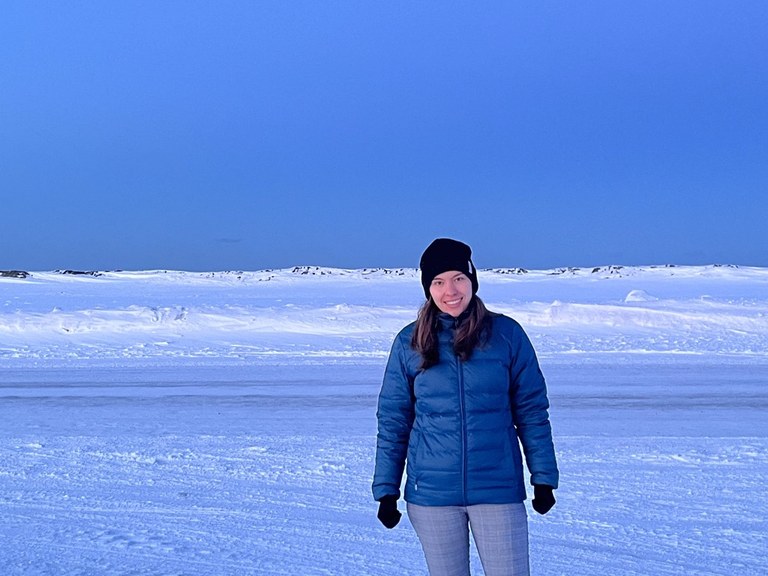
The photo was taken during the instrument set-up in Utqiagvik, Alaska, in December 2023.
Foto-Rechte: M.Sc. Bianca Lauster
Dr. Friederike Ihssen (Heidelberg) - Kalenderwoche 10
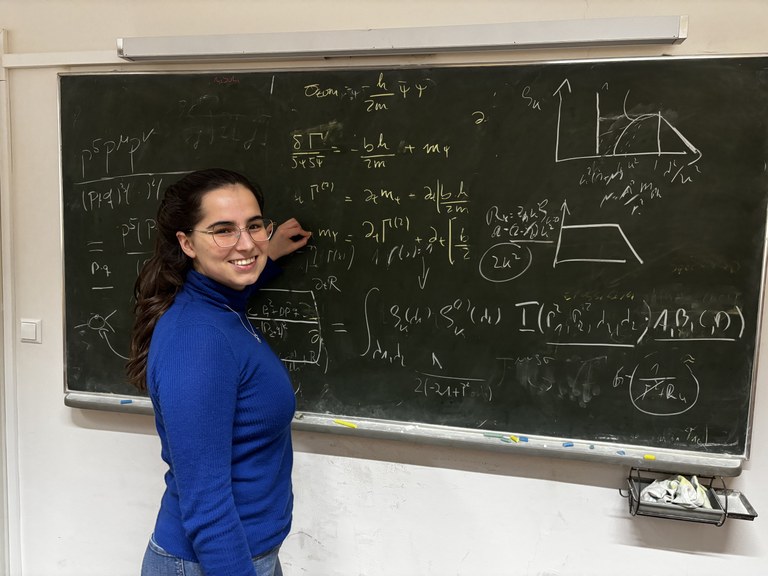
Friederike is a postdoctoral researcher at the Institute for Theoretical Physics in Heidelberg within the Cluster of Excellence STRUCTURES. Her research focuses on describing emergent macroscopic phenomena and phase transitions in quantum field theory, such as the process of dynamic chiral symmetry breaking in the theory of strong interactions, which is known to generate over 99\% of mass in nucleons.
'The whole is greater than the sum of the parts' certainly holds true in strongly correlated systems: Here, microscopic constituents, for example, quarks, form structures at macroscopic scales, e.g., pions and nucleons, whose properties are not only defined by the quantum numbers of its parts but also by fluctuation physics. These systems are often not accessible using standard perturbative calculations.
In her work, Friederike develops the conceptual mathematical and numerical tools to perform non-perturbative calculations in quantum field theory. Her focus lies in particular on the functional renormalization group, which allows to quantify the behavior of theories with changing scales.
Foto-Rechte: Franz R. Sattler
February
Dr. Corinna Kufner (Jena) - Kalenderwoche 9

Corinna is a photophysicist at Leibniz Institute of Photonic Technology (IPHT) Jena, where she studies the influence of light on the emergence of life in the universe.
During her Postdoc at Harvard University, she discovered the light-induced self-repair of short RNA sequences and contributed to an understanding of the first genomic sequences available on early Earth.
Since February 2025, she has led the research department "Photonic Abiogenesis" as a CZS Nexus fellow at Leibniz IPHT, where she seeks to expand the understanding of photochemical mechanisms in astrobiology and modern medicine. Specifically, her research involves the investigation of the emergence of biological functionality and the role of UV light as selection pressure in the emergence of the molecular building blocks of life.
Foto-Rechte: Stela Todorova, Leibniz-IPHT
Dr. Anna Seiler (ETH Zurich) - Kalenderwoche 8
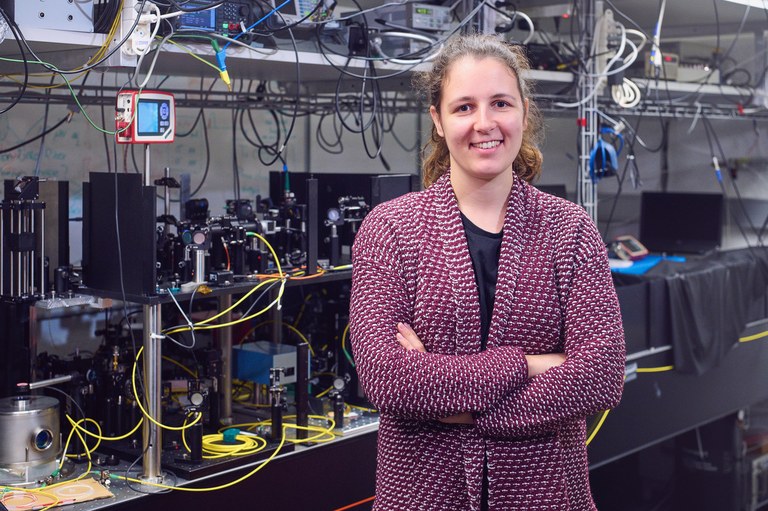
Foto-Rechte: Kilian Kessler/D-PHYS/ETH Zürich
M.Ed. Ann-Sophie Meyer (Duisburg-Essen) - Kalenderwoche 7
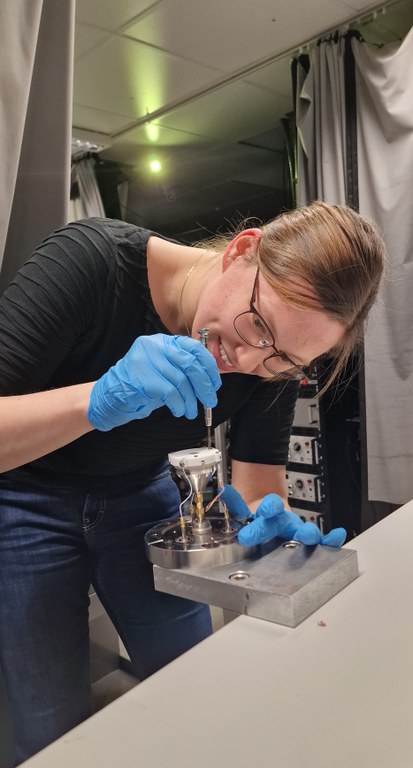
Ann-Sophie is a PhD student in Marika Schleberger's group at the University of Duisburg-Essen. She received her Master of Education in mathematics and physics with the goal of becoming a teacher. However, after completing her degree, she decided to embark on a research career and her doctorate in physics. As part of the CRC 1242, her research focuses on ultrafast non-equilibrium dynamics in condensed matter, particularly through time-resolved ion-induced photoelectron emission spectroscopy.
Simulations predict that the interaction and relaxation processes within the electronic and phononic systems following an ion impact occur on timescales ranging from sub-picoseconds to nanoseconds. Experimentally verifying these dynamics, however, poses a real challenge due to the precision required to pinpoint the ion impact in time and the creation of a suitable (sub-)picosecond ion pulse. Within the framework of Project C05 of the CRC 1242, such a source has been developed, enabling the creation of picosecond ion pulses via femtosecond photoionization of noble gas atoms.
Building on this achievement, Ann-Sophie is conducting the world ́s first pump-probe experiment using ions as a pump source. Her work investigates ion-induced non-equilibrium dynamics in solids, providing unprecedented experimental insights into these processes. This research represents a groundbreaking step in understanding the fundamental ultrafast dynamics triggered by ion impacts.
Foto-Rechte: Ann-Sophie Meyer
Dr. Christina Knapek (Greifwald) - Kalenderwoche 6
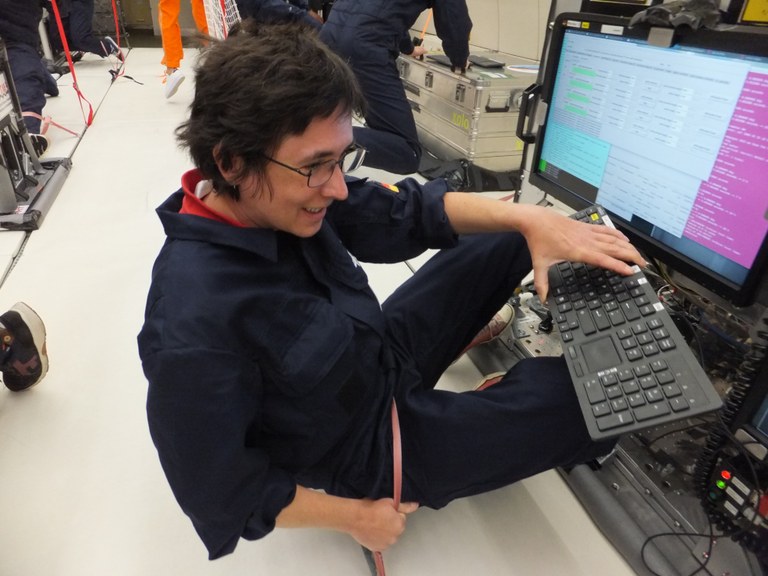
Christina is an experimental physicist at the University of Greifswald. She works on a project to design and build a facility for research on complex, or dusty, plasma under microgravity conditions onboard the International Space Station (ISS). To investigate scientific questions and test the functionality of the equipment for the future facility, she regularly participates in parabolic flight campaigns (see photo), which provide short periods of reduced gravity. She aims to advance the experimental possibilities and scientific outcomes of her research field, in collaboration with space industry and an international group of scientists.
Christina obtained her PhD in physics at the Max Planck Institute for Extraterrestrial Physics (MPE) in Garching and the Ludwig Maximilian University of Munich in 2010. She continued her research on complex plasmas at MPE with the aim to design a facility for complex plasma research onboard the ISS. In 2014, this work was continued at the German Aerospace Center (DLR) in Oberpfaffenhofen, where she was appointed leading project scientist for the space project. She initiated the transfer of the project, funded by the DLR German Space Agency, to the University of Greifswald in 2022.
Foto-Rechte: Dr. Christina Knapek
January
Dr. Christiane Klein (York, UK) - Kalenderwoche 5
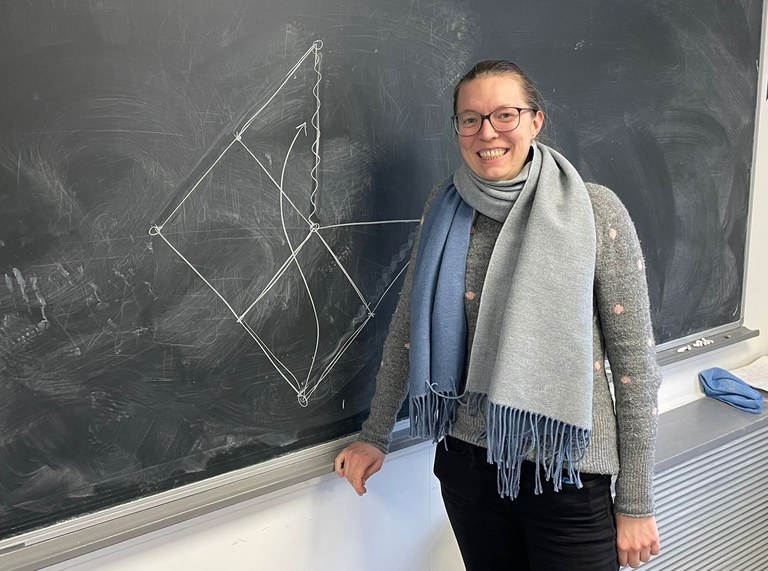
After a one-year postdoc position in Grenoble, she is now a Walter Benjamin fellow at the University of York, where she continues to work on quantum field theory on curved spacetimes within the algebraic approach. That includes the construction of physically reasonable states, which is a highly non-trivial problem in curved spacetimes, but also the answer to more conceptual questions involving the theory of measurements within algebraic quantum field theory.
Foto-Rechte: Daan Janssen
Dr. Andrea Bergschneider (Bonn) - Kalenderwoche 4
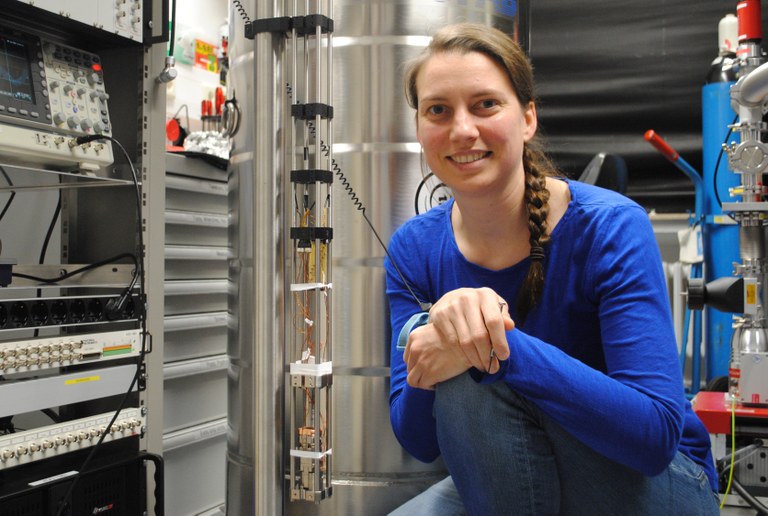
Andrea is an experimental physicist at the Institute of Physics of the University of Bonn, where she explores quantum phenomena in two-dimensional systems using two experimental platforms: ultracold quantum gases and van der Waals semiconductors.
During her Master's and PhD, Andrea focused on deterministic few-atom systems in optical tweezers. In these ultracold-atom experiments she developed a new atom-resolved imaging technique and studied the built-up of strong correlations and quantum entanglement. Drawn by her interest in quantum optics and condensed matter, she pursued a postdoc at ETH Zurich, where she studied cryogenically cooled two-dimensional monolayer semiconductors -- layered crystals bond by weak van der Waals forces. Her work included investigating their optical properties and interactions within optical cavities.
In 2021, Andrea joined the University of Bonn as a senior researcher, where she co-supervises an experiment on fermions in two-dimensional optical lattices. Since 2023, she has led an independent project on transition-metal dichalcogenides as part of the Cluster of Excellence "Matter and Light for Quantum Computing." Her unique expertise in both synthetic and natural two-dimensional materials allows her to connect atomic, quantum optic, and solid-state quantum science and transfer ideas between these fields.
Foto-Rechte: Moritz Scharfstädt
Dr. Lisanne Sellies (Zurich, Switzerland) - Kalenderwoche 3
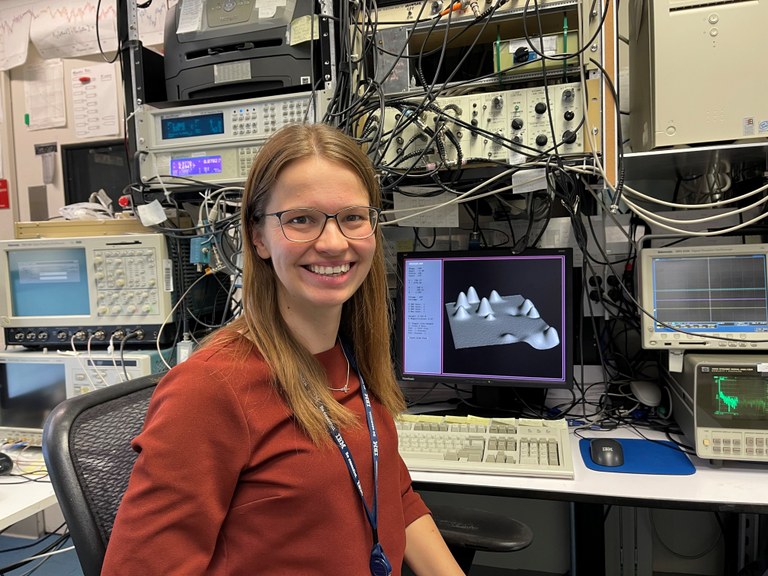
Lisanne receives the Gustav Hertz Prize 2025 from the DGP 'For the development of a new method that for the first time measured electron spin resonance with a scanning force microscope on individual molecules.'
Foto-Rechte: Gregory Czap
Dr. Kristiane Bernhard-Novotny (Geneva, Switzerland) - Kalenderwoche 2
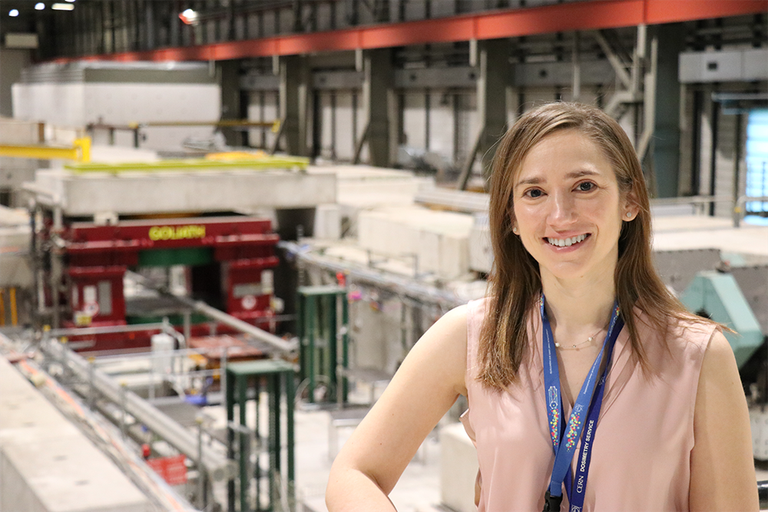
Now part of CERN’s Experimental Areas group, Kristiane works as a Communications Officer, combining her technical expertise with effective science communication. She supports a wide range of projects, including the Physics Beyond Colliders Initiative, the International Muon Collider Collaboration, and the many fixed-target experiments at CERN. In addition to creating tailored communication strategies and writing articles for CERN’s website and international journals, she actively advocates for these projects, ensuring they receive the visibility and support they deserve within the scientific community and beyond.
Foto-Rechte: Laurie Nevay
Dr. Johanna K. Jochum (Garching) - Kalenderwoche 1
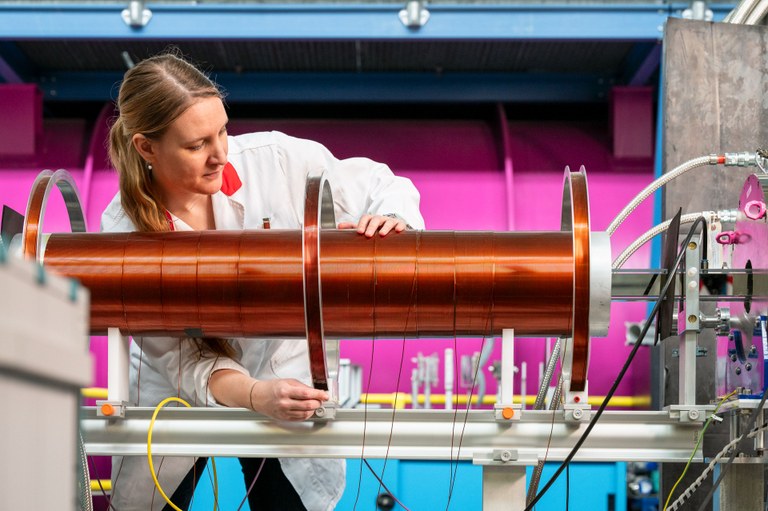
Johanna's scientific interests center on superconductivity and magnetic phenomena, including magnetic phase transitions and unconventional magnetic order. During her PhD at KU Leuven, she explored interface phenomena in magnetic nanostructures, gaining extensive experience in large-scale facilities for x-ray and neutron scattering to investigate the magnetic and vibrational properties of these systems. Her research continues to bridge experimental techniques and fundamental insights into the complex behaviors of materials.
Johanna completed her Bachelor's and Master's degrees at ETH Zurich. For her Master's thesis in the group of Bertram Batlogg, she studied "Transport properties in SmFeAs(O, F)," delving into the fascinating field of iron-based superconductors. She brings this rich background and her passion for cutting-edge instrumentation to her current work, contributing to the development of neutron scattering techniques and the understanding of magnetic systems.
Foto-Rechte: Astrid Eckert, TUM
Hier geht es zu den Teilnehmerinnen der Physikerin der Woche 2018, 2019, 2020, 2021, 2022, 2023 und 2024 Projekte.